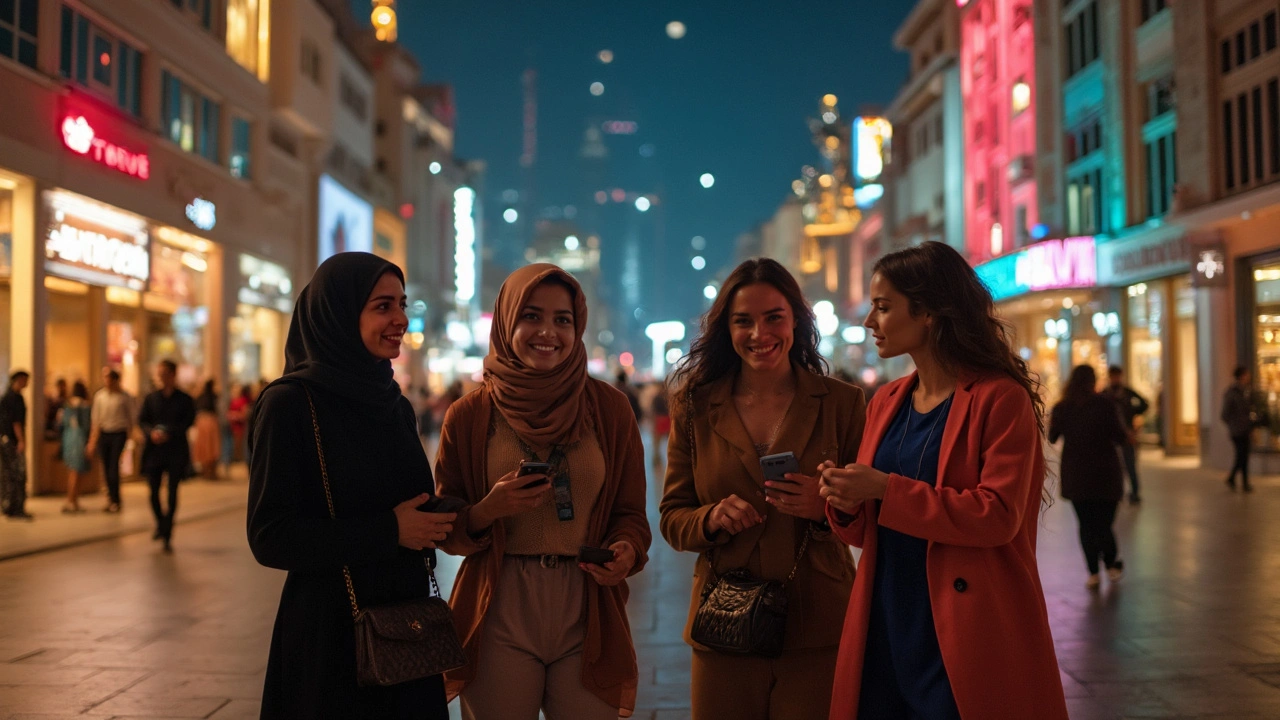Do You Speak English in Dubai? Everything You Need to Know
 Jun, 4 2025
Jun, 4 2025
People picture Dubai as all glamour, bright lights, and fancy hotels, but let’s face it—no one wants to get lost in translation. If you’re wondering if you need to speak Arabic to get by, here’s a relief: English is pretty much the go-to language everywhere in Dubai. From hotels and malls to taxis and restaurants, you’ll hear English way more than Arabic in day-to-day conversations, especially in places where tourists and expats hang out.
So, if you’re an escort or just someone trying to get around, ordering food, asking for directions, or chatting with clients shouldn’t be stressful. Most people you meet, including police, store staff, and even random folks on the street, can handle simple English chats without blinking. But there can still be some hilarious or awkward moments, so knowing a few basic Arabic words or phrases can sometimes help break the ice, especially in older neighborhoods or if you end up with a taxi driver who’s not super confident in English.
Don’t worry about using perfect grammar or sounding polished. People in Dubai are used to a mix of accents and levels of English, and they just want clear, basic communication. If you mess up a verb tense or use slang, no one’s going to judge. Here’s the truth: It’s way more about being patient and friendly than being a language expert. The city runs on a mix of cultures, and English is everyone’s common ground.
- Why English Works in Dubai
- Language Barriers and Surprises
- Tips for Smooth Communication
- How Language Impacts Experiences
Why English Works in Dubai
If you’re in Dubai and wondering how it got so easy to use English just about everywhere, it’s thanks to the city’s big mix of people. Over 85% of Dubai's population is made up of foreign workers from all over the world. The city’s official language is Arabic, but English is definitely the common ground—and honestly, it’s a lifesaver if you don’t know any Arabic. Signs, menus, government forms, and even medical services are all available in English.
| Population | Approximate Percentage |
|---|---|
| Emirati Locals | 15% |
| Expats (All Nationalities) | 85% |
| People Who Speak English | 80%+ |
All those expats—from India, the UK, the Philippines, Europe, Australia, Russia, and literally everywhere—need a language to connect. That’s where English steps in. It’s the working language for pretty much every industry, including hospitality, retail, and even government offices dealing with the public. So, if you’re navigating the English in Dubai scene, you’re not alone and you won’t have to play charades to get a coffee.
Dubai also wants to stay a top tourist and business spot, so it’s 100% in their interest to make English the “default” option for visitors. That’s why metro announcements, traffic signs, and instructions at the airport are all in English and Arabic, sometimes even in other languages depending on the crowd.
- Most public workers—like police and health professionals—are trained to speak English well enough to help out in any situation.
- English is the main language for schooling, especially in international and private schools, making it common for even young kids growing up in Dubai.
- Hospitals, banks, and hotels run their daily business in English and staff members are hired based on their language skills.
Bottom line? You don’t need to stress or cram last-minute Arabic phrases. English is your ticket to almost anything in Dubai, from a night out to a quick lawyer appointment.
Language Barriers and Surprises
Here’s where things get interesting. Even though English in Dubai is everywhere, you’ll still run into language blips—especially off the tourist track or in certain neighborhoods away from the malls and big hotels. Dubai is a super diverse city, with over 200 nationalities living here. Lots of expat workers come from places like India, Pakistan, the Philippines, and Africa, so you’ll hear all kinds of accents and local phrases mixed in.
Sometimes, the person you’re talking to can speak basic English but struggles with slang or fast talking. For example, you might ask for a "receipt" in a small shop and get a blank look, but if you say "bill," they’ll get it. Simple words and direct sentences work best. Local Emiratis usually speak excellent English, but workers in service jobs might only know the basics. So, patience is key if someone needs you to slow down or repeat yourself.
- In older parts of town like Deira or Karama, taxi drivers or shop owners often speak better Hindi, Urdu, or Tagalog than English, so keep your directions clear and use landmarks rather than addresses when possible.
- Menus in restaurants may have funny mistranslations—don’t panic, just double-check or even point at a photo if you’re unsure.
- If you need official paperwork or visit a clinic, English is common, but always ask for clarification if a form looks confusing or you’re getting medical instructions.
One little-known tip: Many Dubai residents use WhatsApp to avoid awkward phone calls, since reading is sometimes easier than listening for those with limited English. Sending a text or even a map pin can save a lot of time and hassle.
Lots of escorts in Dubai have learned to carry business cards or details written in both English and Arabic. It’s a simple backup if your accent or theirs makes communication tricky. And honestly, the occasional misunderstanding usually ends up being funny rather than frustrating. Just smile, stay calm, and remember—everyone’s winging it in this city, not just you.

Tips for Smooth Communication
It’s easy to let nerves take over if you think your accent or vocabulary might cause confusion. But trust me, you don’t have to be a native speaker to get by in Dubai—just follow a few street-smart rules, and you’ll be golden. Here’s what actually works on the ground, whether you’re meeting clients, chatting in a hotel lobby, or ordering room service.
- English in Dubai is the default for most service jobs, so don’t feel weird about approaching staff in English first. A simple greeting goes a long way—"Hi, excuse me" will open almost any door. Don’t overthink your wording. Stick to basic sentences like “Where is this place?” or “How much?”
- Pick up some common local phrases. It’s not about showing off; even a few words in Arabic (“shukran” for thank you, “salaam” for hello) can help you connect. Most expats do this, and locals appreciate the effort.
- If you hit a language wall (and it happens sometimes, especially with taxi drivers or older workers), just repeat your message slowly or write it down. People in Dubai are used to this and usually know a workaround, like translating on their phone or calling a coworker for help.
- Learn the names of important locations in English since that’s how most places are referred to in cabs, online bookings, and by hotel staff. For example, saying “Mall of the Emirates” or “Dubai Marina” is way more clear than trying to translate or spell out the Arabic.
- Use maps and translation apps. Google Maps is a lifesaver if things get confusing, and Google Translate can fix the occasional “lost-in-translation” moment fast.
One more practical tip—Dubai is a melting pot, so you’ll meet people with all kinds of accents, from Filipino to Indian to Russian. If you have trouble understanding someone, it’s totally fine to ask them to repeat or slow down. Folks in Dubai are generally patient; they get it. Just be open, friendly, and clear, and you’ll avoid nearly all communication hiccups.
How Language Impacts Experiences
Your experience in Dubai can totally change depending on how you handle language. For most people working in the English in Dubai scene, feeling confident with English makes life way easier. When you walk into a hotel lobby or a fancy club, staff expect you to talk in English. Even basic stuff like booking a room, getting room service, or dealing with security goes smoother if you stick to simple English.
Now, here’s something cool: More than 80% of Dubai’s population are expats, and the city has over 200 nationalities living side by side—so English isn’t just a bonus, it’s kind of the city’s survival strategy. Locals use English for business, customer service, and anything tourist-facing. Even public signs, transport maps, and menus are in English. The only time you might find language a challenge is in older neighborhoods, small back-street shops, or with new arrivals who may not have picked up much English yet.
But let’s get real—language isn’t just about ordering food or giving directions. It plays a big role in how comfortable (and safe) you feel. Escorts say that clear English communication with clients helps set boundaries and avoid awkward confusion, which is a lifesaver in any city, but especially in one so strict about laws and behavior.
- Understanding instructions from hotel staff or security becomes hassle-free.
- Texting or calling drivers, guides, or guests is straightforward without any translation apps.
- Most booking apps and websites are English-friendly—no need to stress or second-guess reservations.
- If you ever need legal help or visit a clinic, there’s usually someone who can translate your needs into English, so you’re not left in the dark.
Just in case you’re wondering, here’s a quick breakdown of where you’ll use English the most and where it can get tricky:
| Situation | English Usage | Possible Issues |
|---|---|---|
| Hotels & Hospitality | Very common | Almost none |
| Nightlife & Clubs | Very common | Occasional noise misunderstandings |
| Taxi & Ride Apps | Very common | Some drivers prefer basic phrases |
| Markets/Old Shops | Less common | Use simple words, hand gestures help |
| Official Services (Police/Clinics) | Common | Might wait for an English speaker |
At the end of the day, a smile and a few clear words in English get you further than perfect fluency. Don’t stress about accents or grammar. Dubai is all about getting the message across, not passing an English test.
Dubai Escort